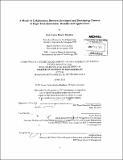A model of collaboration between developed and developing clusters of high-tech innovation : benefits and applications
Author(s)
Botero Ramírez, Juan Carlos
DownloadFull printable version (9.642Mb)
Other Contributors
Sloan School of Management.
Advisor
Fiona Murray.
Terms of use
Metadata
Show full item recordAbstract
Innovation is not produced in an isolated fashion but rather it is a highly interactive process where firms establish a wide variety of networks. This concept is valid for any cluster at any stage of development. Innovation is not even a local process; it should be a global system where firms can interact and exchange ideas. Collaboration between developed and developing clusters of innovation is proposed here as a way to obtain enormous benefits for both types of clusters. Developing an innovation cluster may take a long time and requires the participation of many actors: Universities, government, entrepreneurs, and the private sector. Every one of them has a role in the development of an innovation cluster in a developing economy. Collaboration between a developed innovation cluster and a developing cluster is analyzed in this paper as a catalyzer of the development of such clusters, with clear benefits for both. In order to be able to work with developed clusters, a developing cluster has to leverage its current strengths to build up a more technological, innovation-driven ecosystem, receiving collaboration from developed clusters. It means that the process to select a cluster to compete is neither random nor based on the desires of policymakers. Rather, this is a process that should arise from the strengths and skills obtained by other less developed clusters in the emerging economy. This is an evolution from a first-generation cluster to a third-generation cluster. The city of Medellin is positioning as a high-tech innovation hub in Colombia; however, it is still lagged in terms of the quality of its research centers, high-level institutions, and participation of the private sector. Surrounding these reasons is a lack of qualified people able to think locally but at the same time able to build up networks to insert the developing cluster into the global markets. On that sense I propose here a triad of clusters: Cambridge in Massachusetts, Amsterdam in Holland and Medellin in Colombia. Collaboration among these three cities would bring enormous benefits to all of them, building on the strengths that each one can bring to the table.
Description
Thesis (S.M.)--Massachusetts Institute of Technology, Sloan School of Management, 2013. Cataloged from PDF version of thesis. Includes bibliographical references.
Date issued
2013Department
Sloan School of ManagementPublisher
Massachusetts Institute of Technology
Keywords
Sloan School of Management.